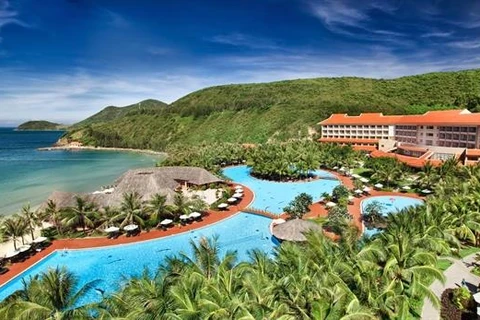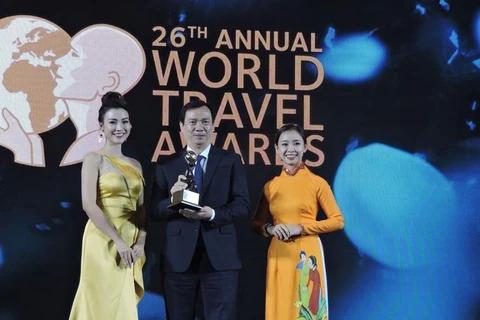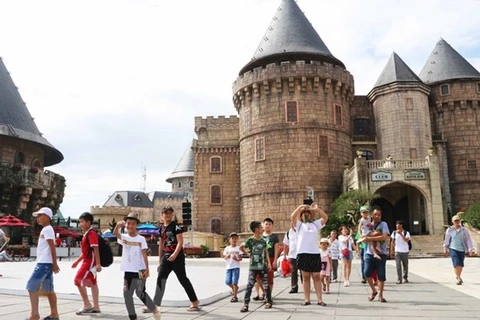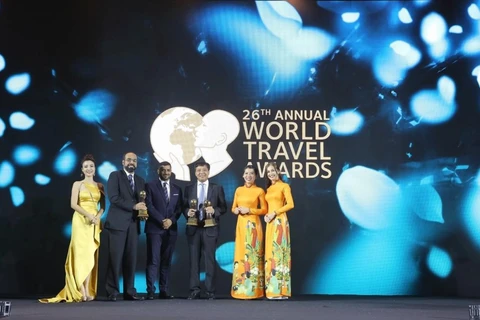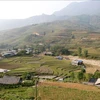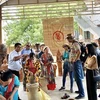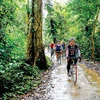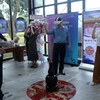Hanoi (VNA) - Hotelismo.vn is expected to become a bridge between workers, students, schools and businesses, contributing to creating an ecosystem with a progressive thinking in recruitment environment.
The website specialised in hospitality human resources and recruitment www.hotelismo.vn has been put into operation by the Vietnam Hotel Human Resources Organisation (VHRO) under the Vietnam Hotel Association (VHA).
Its aim is to create an environment for exchange in hospitality human resources training, reduce recruitment and training costs, make hospitality recruitment market transparent and create career development opportunities for the industry's workforce.
It is expected to become a bridge between workers, students, schools and businesses, contributing to creating an ecosystem with progressive thinking in the recruitment environment, building a community of hospitality workforce, thus inspiring passion for the next generations.
VHRO Chairwoman Nguyen Thi Thanh Thuy said: “Via the Hotelismo ecosystem, we want to work with schools to help students with career orientations, learn from each other and create a transparent recruitment environment, partly contributing to the success of tourism sector and travel agencies in particular.
 The number of lodging facilities in Vietnam has increased significantly in recent years while the number and quality of workforce remains limited. (Photo: VietnamPlus)
The number of lodging facilities in Vietnam has increased significantly in recent years while the number and quality of workforce remains limited. (Photo: VietnamPlus) As many as 738 hotels, resorts, over 15,600 applicants, 500 experts and 18,000 job offers have so far joined Hotelismo.vn
With rapid development, Vietnam’s tourism sector is facing challenges regarding the quality and lack of workforce.
As of the late December 2018, Vietnam had 28,000 lodging facilities, including 152 five-star hotels with 51,810 rooms, 276 four-star hotels with 36,754 rooms, and 537 three-star hotels with 38,170 rooms.
To serve them, the whole industry uses 1.3 million direct workers, accounting for 2.5 percent of the total labor force nationwide. Only 42 percent of them were trained in tourism, 38 percent were trained in other fields, and about 20 percent underwent on-site training instead of formal training. Therefore, the number and quality of skilled workers in tourism industry is both insufficient and poor.
On July 26, the Hanoi University (HANU) and Switzerland’s International Management Institute (IMI) introduced a hospitality management training course to mid and high-level managers for Vietnamese travel agencies and hotels.
The six-month course featured seven subjects taught in English, including marketing management in services; sustainable hotel operation, financial and human resources management, sustainable tourism business and strategy governance; and case studies.
The course was funded by the Swiss State Secretariat for Economic Affairs under the auspices of the Swiss Sustainable Tourism Programme.
The Vietnam National Administration of Tourism (VNAT) forecast that Vietnam needs over 4.5 million tourism workers, more than 1.5 million of them are direct workers, by 2025 and over 7 million, with over 2.3 million direct ones, by 2030.
With professional investment in technology, highly applicable features and interface, www.hotelismo.vn (available on both app store and Google play) aims to become a leading website of Vietnam's hospitality industry in matters related to human resources.
Vietnam’s tourism is booming, establishing itself as one of Southeast Asia’s top destinations. More than 15 million foreigners visit each year, compared to only 4 million a decade ago, alongside roughly 80 million domestic traveller-trips, which have similarly quadrupled over the same period. Average growth of 13.5 percent per annum is forecast for 2019-2023 with total arrivals to reach 29.1 million by 2023, according to Savills Vietnam.
According to the UN World Tourism Organisation (UNWTO), Vietnam ranked in the world’s top 20 fastest growing travel destinations in 2017. By 2025, the industry aims to contribute 10 percent of gross domestic product and generate income for 6 million people.
To reach this target, the VNAT said the tourism sector needs nearly 40,000 more labourers every year, particularly skilled workers and qualified professionals./.
